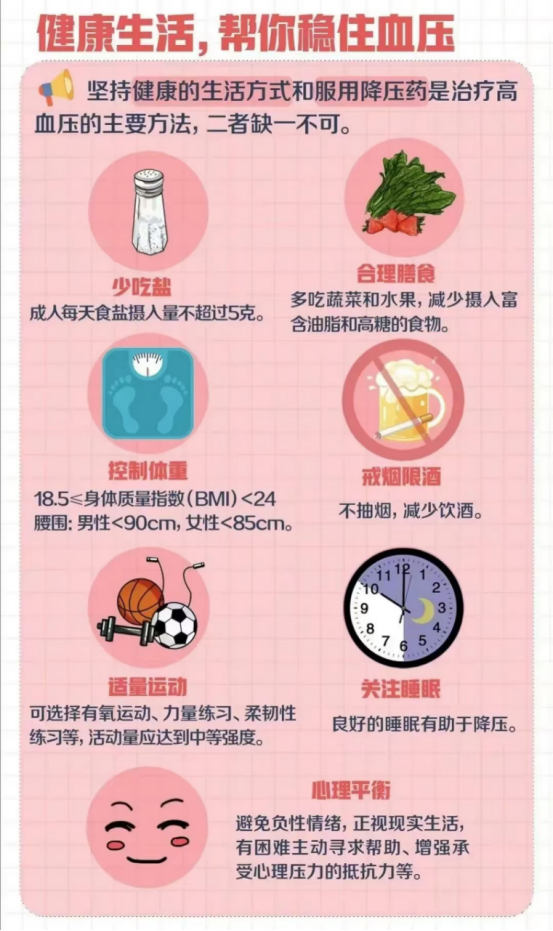In our life, hypertension is like a hidden “health killer”, if not taken seriously, it may lead to serious consequences-cerebral hemorrhage. 1. Understanding hypertension Hypertension, simply speaking, is the excessive pressure on the blood vessel wall when blood flows in the blood vessel. Many people may think that high blood pressure is just a little higher, no big deal. But in fact, long-term hypertension can cause great harm to the body. The symptoms of high blood pressure are not obvious, and many people may not feel anything, but that doesn’t mean it’s not damaging your body. It is like a silent destroyer, quietly eating away at your veins. If your blood pressure stays at a high level for a long time, the walls of blood vessels will be continuously impacted by high pressure and become more and more fragile. 2. The principle of cerebral hemorrhage caused by hypertension When the blood vessel wall becomes fragile, it is easy to rupture, especially in the blood vessels of the brain. When the blood vessels in the brain rupture, blood will flow into the brain tissue and form cerebral hemorrhage. Brain hemorrhage is not a small problem. It can cause serious damage to the brain. Blood can compress the surrounding brain tissue, leading to hypoxia and necrosis of brain cells, which in turn affects the normal function of the brain. 3. The harm of cerebral hemorrhage 1. Physical dysfunction cerebral hemorrhage may lead to paralysis on one side of the body, making you incapacitated. You may not be able to walk properly, carry things, or even take care of yourself. 2. Language barriers Some people will have language barriers such as unclear speech and inability to express their meaning after cerebral hemorrhage. This will make your communication very difficult and make you feel lonely and helpless. 3. Cognitive disorders and cerebral hemorrhage may also affect your memory, thinking ability and other cognitive functions. You may forget things, become confused, and even fail to recognize your family and friends. 4. Life-threatening severe cerebral hemorrhage may endanger life. If the amount of bleeding is large or the bleeding site is critical, it may lead to death in a short time. 4. How to prevent hypertension and cerebral hemorrhage 1. Healthy diet, reduce salt intake, eat more fresh vegetables, fruits, whole grains and other foods rich in dietary fiber. Avoid foods with high fat and cholesterol, such as fried food and animal viscera. Potassium-rich foods, such as bananas and potatoes, can be added to the diet to help lower blood pressure. 2. Moderate exercise, such as walking, jogging and swimming, can help you control your weight and lower your blood pressure. However, it should be noted that the intensity of exercise should not be too high to avoid overwork. Get at least 150 minutes of moderate-intensity aerobic exercise per week. 3. Quit smoking and limit alcohol consumption smoking and excessive alcohol consumption increase the risk of hypertension and cerebral hemorrhage. So, for the sake of your health, you’d better quit smoking and limit alcohol. 4. Controlling emotional fluctuations can also lead to elevated blood pressure. Therefore, we should learn to control our emotions and maintain peace of mind. Stress and difficulties can be relieved by listening to music, meditating and communicating with friends. 5. Regular physical examination, regular blood pressure measurement, timely detection of hypertension and treatment. If you already have high blood pressure, you should treat it according to the doctor’s advice, take medicine on time and review it regularly. 6. Control weight and keep body mass index (BMI) between 18.5 and 23.9, waist circumference no more than 90 centimeters for men and 85 centimeters for women. 7. Get enough sleep make sure you get enough sleep every day. The average adult needs 7-8 hours of sleep. Good sleep helps to maintain the normal physiological function of the body and reduce blood pressure. 8.cut your caffeine intake too much caffeine may raise your blood pressure. Therefore, we should control the intake of coffee, tea and some functional drinks. 9. Regular blood pressure monitoring suggests regular blood pressure measurement, especially for high-risk groups with family history of hypertension, obesity, long-term smoking and drinking, and older than 40 years of age, blood pressure changes should be closely monitored. If blood pressure is found to be elevated, they should seek medical treatment in time and be treated under the guidance of doctors. In short, hypertension and cerebral hemorrhage are serious health problems, but as long as we pay attention to them and take correct preventive measure, we can reduce their risk. From now on, let’s pay attention to our health, develop good living habits, and stay away from the threat of hypertension and cerebral hemorrhage. 
Posted inHealth and wellness